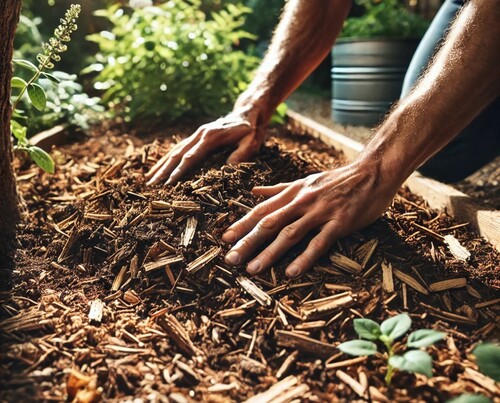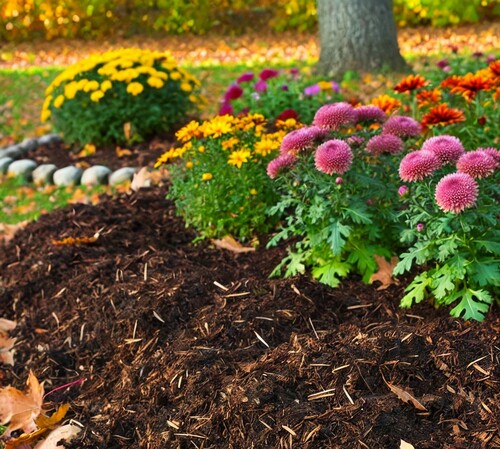Mulching Your Garden During the Autumn Season
Introduction
As autumn sets in, it’s time to prepare your garden for the colder months ahead. One essential fall garden task is mulching. Not only does mulching protect your plants and soil through winter, but it also ensures your yard looks tidy and healthy during the dormant season.
Why Mulching in Autumn is Essential
Mulching in the fall provides several advantages, including soil insulation, moisture retention, and weed control. By applying mulch now, you create a protective layer that helps regulate soil temperature, prevents erosion, and minimizes the growth of weeds, saving you time and effort when spring comes around. Here’s a guide to help you mulch effectively this season.
How to Mulch in the Fall

Mulching Boosts Plant Health and Soil Quality
Proper mulching requires a few steps to ensure your landscaping is well-prepared for the coming winter and the growth seasons beyond. Follow these steps to maximize the benefits of fall mulching.
Preparing Your Garden Beds for Mulching
Before you apply mulch, it’s crucial to prep your garden beds. Start by harvesting any remaining plants, flowers, or vegetables that are still growing. For plants that have died, clear them from the beds. This not only tidies up your garden but also prevents pests and diseases from lingering in the soil.
Steps to Prepare:
- Remove debris: Clear away dead plants, twigs, and other organic matter. Compost healthy plant material if possible, but dispose of diseased plants properly.
- Weed thoroughly: Remove weeds at their roots to prevent them from sprouting up again in the spring. Mulching over weeds can make them harder to manage later.
- Till the soil: If necessary, use a rototiller to aerate the soil and break up compacted areas. This allows nutrients and water to penetrate more easily, improving soil health.
- Shred fallen leaves: If you plan to use leaves as mulch, ensure they are finely shredded. Whole leaves can mat down and create an impenetrable barrier for water and air.
Choosing and Applying Mulch

Compost Mulch Enhances Fall Garden Health and Vibrancy
Selecting the right mulch is important for maximizing its effectiveness. Organic mulches are ideal for improving soil quality, while inorganic mulches are better for aesthetic purposes and long-term weed control.
Recommended Mulching Materials:
- Seedless mulch: To avoid encouraging weed growth, opt for mulch that is free of seeds. Organic materials like shredded leaves, grass clippings, pine needles, and sawdust are great options.
- Composted mulch: For nutrient-rich mulch, consider using composted organic matter. It will gradually break down and enrich the soil throughout winter.
- Wood chips: Wood chip mulch provides excellent insulation and long-lasting weed control, making it a solid choice for garden beds.
Applying Mulch:
- Depth of mulch: Spread mulch evenly, creating a layer about 2 to 4 inches thick. Any deeper may suffocate plants, while too thin of a layer won’t provide enough protection.
- Fertilizer: Before laying down mulch, apply a nitrogen-rich fertilizer . Organic mulch can deplete nitrogen as it decomposes, so adding this nutrient helps maintain soil health. A good rule of thumb is to use one cup of nitrogen fertilizer per cubic foot of mulch.
- Weed barriers: For garden areas with plants that are still growing, lay a thin barrier such as newspaper or landscape fabric before adding 6–8 inches of mulch. This helps block weeds while allowing water and nutrients to reach plant roots.
Benefits of Mulching in the Fall
You might wonder why autumn is the best time to mulch. Here are some compelling reasons to mulch before winter sets in:
Weed Control
Mulching in fall reduces weed germination by covering the soil, limiting exposure to sunlight, which weeds need to grow. By spring, you’ll have fewer weeds to manage, saving time and labor.
Soil Insulation and Moisture Retention
A good mulch layer acts as a blanket for your soil, insulating plant roots against freezing temperatures. Additionally, mulch retains moisture in the soil by reducing evaporation, ensuring your plants stay hydrated throughout the winter.
Improved Soil Health
Organic mulch gradually decomposes, enriching the soil with essential nutrients. This boosts soil fertility and promotes healthy plant growth when the growing season returns.
Reduced Garden Maintenance
By mulching in the fall, you give yourself a head start for spring. Instead of clearing out winter debris and battling early weeds, you’ll find your garden already primed for new growth.
Contact a Professional for Mulching Services
If you’re unsure how to mulch your garden beds this fall or simply don’t have the time, consider hiring a professional. Mulching requires precision to ensure it’s done effectively, and a landscaping expert can help ensure your garden is prepared for the winter ahead.
For those in the San Francisco Bay Area , Arborist Now is your trusted partner for all your autumn landscaping needs, including mulching, yard cleanup, and more. We use eco-friendly practices and locally sourced materials to ensure your garden thrives year-round.
Ready to Mulch Your Garden?
Contact Arborist Now today to ensure your trees and landscape get the proper mulching care they deserve.
Originally posted on October 24, 2019.


